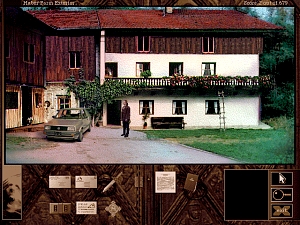 Typically, we have “exclusive” fallout from the console war which forces the hand of the consumer to purchase all consoles to play all the games they love. Many hardcore gamers are into first person shooters like Halo and Gears of War but also like their Grand Theft Auto and Final Fantasy fixes. In years prior, you’d have to invest in Microsoft and Sony’s solutions to get your fix. Now things are changing.
Typically, we have “exclusive” fallout from the console war which forces the hand of the consumer to purchase all consoles to play all the games they love. Many hardcore gamers are into first person shooters like Halo and Gears of War but also like their Grand Theft Auto and Final Fantasy fixes. In years prior, you’d have to invest in Microsoft and Sony’s solutions to get your fix. Now things are changing.
With these third party developers playing neutral in the war on consoles, Microsoft and Sony are forced to rely on near “first-party” titles to keep their army strong. Metal Gear Solid is a Sony exclusive and Gears of War and Halo have been Microsoft’s hype babies for a year or so now. The problem? Many of these exclusive games are not divisions, subsidiaries or in any way under the wing of the console makers.
Nintendo holds exclusive rights to almost all their hard hitting titles. Mario, Link, Zelda, Samus Aran and all their mascot style characters are designed, developed and marketed under the name “Nintendo.” These characters are all part of Nintendo’s lineup of solid best selling titles including the Metroid, Zelda and Super Mario Bros. series and all their spin-offs. Nintendo has the power to re-implement their characters into games like Mario Party, Mario Kart, Links Crossbow, Metroid Prime, Metroid Pinball and a huge array of other first party titles.
Microsoft and Sony must continue to play nice with Konami, Bungie, and Epic Games to keep their exclusivity. What happens if one of these developers “betrays” their console and starts shipping multi-platform?
Epic Games and Konami are big time developers with their own independent thinking, would they ever push away from their exclusive deals with their partners? Bungie is no longer part of Microsoft but is bound, in some ways, to deliver Halo products on Microsoft’s console (for now). If these hard hitting blockbuster titles go multi-platform the war would get bloody.
These major publishers could indeed ship non-exclusive product lines in favor of a wider audience if, in fact, the console units grow closer in sales numbers. Sony’s PlayStation 3 console slowly creeps up to the sales figures of the Xbox 360 which means publishing a title on one console may only net you 50% of the possible audience (assuming a small number actually own both consoles). Given both are “hardcore” consoles, this also means those gamers are ready and willing to buy 2-3 video games a quarter for their console(s).
Why would a publisher settle for half the audience when they can ship on two platforms and grab a bigger piece of the pie? The console developer, Sony or Microsoft, would have to bribe pay the publisher money for an exclusive or timed exclusive deal. That’s all fair in business, but what if the competition becomes heated enough that a paid exclusive pays out less than selling on both consoles?
If the major publishers backing Microsoft and Sony opt to ship on both consoles this will force Sony and Microsoft to form higher end first party development teams (or buy them) in order to solidify real exclusivity. In essence, expanding teams (in all gaming genres) like the Microsoft Game Studios to ship more games per year as a sharp weapon against the competition.
The only other option for the console makers would be to let the “exclusives” model die and develop a game industry of watered down consoles with the only major difference being the logo and design of the box.
It might be a hard pill to swallow, but the only way to hold up the highest degree of competition and first party titles is to force everyone to want to buy all consoles.

 One of the great downfalls of an acquisition or merger, in the game industry, is the loss of great franchise titles. Sierra, or
One of the great downfalls of an acquisition or merger, in the game industry, is the loss of great franchise titles. Sierra, or